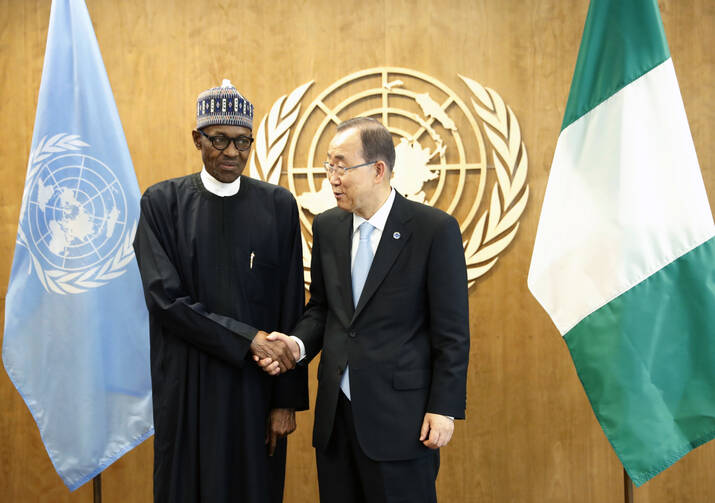Nigeria's President Muhammadu Buhari has invited the United Nations to help negotiations to exchange the kidnapped schoolgirls from Chibok for detained leaders of Boko Haram, a government statement said on Thursday.
Buhari's government has been criticized for failing to free the Chibok girls by parents of the abducted students, community leaders and human rights activists. Boko Haram has kidnapped thousands of people, but the mass abduction of 276 schoolgirls in April 2014 brought international condemnation of Nigeria's home-grown Islamic extremist group. Dozens of the girls escaped, but 217 remain missing.
Buhari's request for U.N. intermediaries is a "show of commitment" made to Secretary-General Ban Ki-moon on Wednesday on the sidelines of the annual U.N. gathering of world leaders in New York, said a statement from presidential adviser Femi Adesina.
Buhari told Ban that his government is "willing to bend over backwards" to win the girls' freedom but finding credible Boko Haram leaders for negotiations has been difficult, especially because of the current leadership struggle among the extremists.
Longtime Boko Haram leader Abubakar Shekau's faction in August posted a video showing about 50 Chibok girls and offering a prisoner swap. An unidentified fighter in the video suggests the government deal with a journalist trusted by the extremists. That was an apparent reference to Dubai-based Nigerian journalist Ahmad Salkida, who was subsequently detained by Nigerian intelligence agents and released. He was accused of knowing the whereabouts of the girls, which he denied.
Last week, Information Minister Lai Mohammed said the government had nearly secured the girls' release three times but negotiations collapsed.
One activist with the Bring Back Our Girls campaign, Washington-based Nigerian Emmanuel Ogebe, said the United Nations is not a suitable intermediary since it has been a victim of Boko Haram attacks. He suggested a better choice would be France, which has helped negotiate the release of Boko Haram kidnap victims in neighboring Cameroon.
Boko Haram attacked the U.N.'s Nigeria headquarters in Abuja, the capital, in August 2011 with a car bomb that detonated in the reception area, killing at least 21 people. Last month, the extremists launched a rocket attack on a humanitarian convoy under military escort in northeast Nigeria, wounding three people including a UNICEF worker. That caused a halt to U.N. aid to dangerous-to-reach areas outside Maiduguri, the biggest city in northeast Nigeria and birthplace of Boko Haram.
Most girls kidnapped by Boko Haram have been forced to marry fighters and are pregnant or have babies, according to some people freed in the past year as the military has recaptured territory.
The government has isolated the only one of the Chibok group to escape this year, saying she is receiving medical care and counseling. However, Human Rights Watch has asked whether Amina Ali Nkeki is now a detainee.
Copyright 2016 The Associated Press. All rights reserved. This material may not be published, broadcast, rewritten or redistributed.








